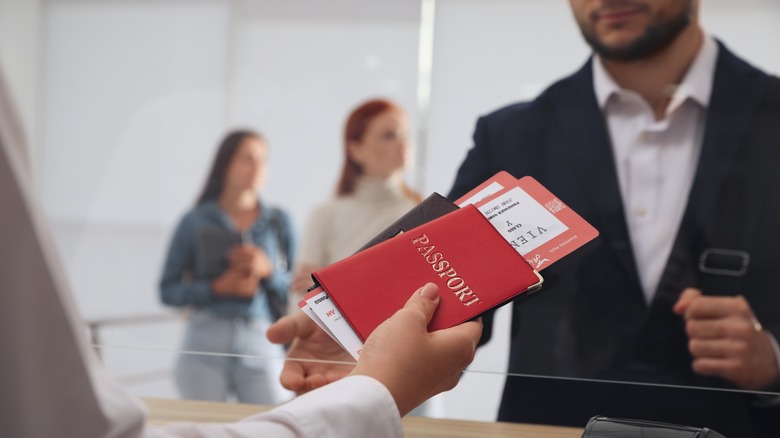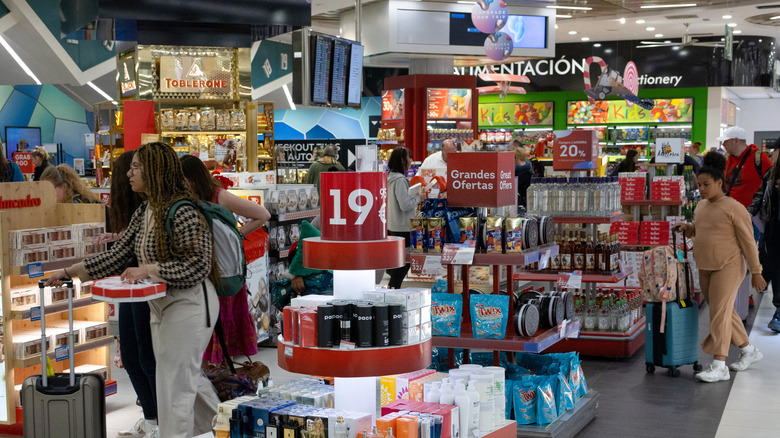Travel Guides International Passports
Kylie McCreary
Getting to another country is often a stressful ordeal. There are so many hoops and hurdles to jump through before you can get to your plane, and it’s hard to breathe easy until you’re actually sitting on board your flight. Until then, there’s always the chance that something could go wrong causing you to miss your flight. There’s a lot to do before you board the plane, after all. Between checking in, going through security, and finding your gate, time management is of the utmost importance. If you’re a savvy traveler, you may try to save precious moments by skipping the lines at the airport check-bag counter and following TikTok’s step-by-step guide explaining how to best get through airport security.
However, there is one distraction that budget-conscious travelers let slow them down — duty-free shopping. Always strategically located between customs and your gate, it’s a major challenge to move past this tax-free haven without browsing a bit. While most people put their passports away after getting past customs, you can save time by keeping yours out. This is because duty-free cashiers will request you show your boarding pass and passport before you make a purchase. Why is that? Mainly so that they can get a tax break.
Showing your passport and boarding pass helps duty-free shops avoid taxes

New Africa/ Shutterstock
Duty-free zones originated as a smart business plan, proposed so that retailers could increase sales at international airports. The concept was sparked from the notion that you’re in somewhat of a government in-between as you depart to another country and this should mean you don’t owe taxes to any particular nation. However, this isn’t really the case legally. Every airport abides by the legal terms of the country it is located in. It is fully up to each country to decide the policies regarding airport taxation.
Many countries have simply decided to implement these duty-free spaces on their own accord. But, because tax-free areas are justified on the premise that the customer is in some ways between countries, customers do have to prove they are leaving the country they are in to receive the tax break. This is why when you arrive at the cashier at a duty-free storefront, they request you to pull out your boarding pass and passport to prove you are going abroad.
If you are flying from somewhere in the EU and are heading to a country outside of the EU, you can save the store some money. By showing them proof you’re headed elsewhere, these companies do not have to pay a Value Added Tax or VAT. This saves them 20% on your purchase. However, depending on where you are, you can usually get this money back.
You can earn some money back by providing your boarding pass and passport

Andresr/Getty Images
It’s pretty standard across international airports that retailers will have you pull out your boarding pass and passport while making a purchase, but this hasn’t always sat right with travelers. In fact, in 2015, the U.K. newspaper The Independent caused an uproar when they revealed that duty-free shops were not charged the VAT if a customer was traveling out of the EU (this was pre-Brexit.) Prior to this report, most people never questioned the document requests of the duty-free cashiers and likely just summed it up as a security measure and moved on.
Many Brits were outraged to discover that rather than giving this 20% tax back to customers, companies were hoarding the savings for themselves. As a result, U.K. citizens began to refuse to show their boarding passes and passports. Today, the U.K. no longer allows for any duty-free retail at all in their airports.
But, if you’re leaving the EU and purchasing a duty-free item in the airport, you can actually apply to have the VAT returned by the local government. The conditions and instructions for doing so are listed on the European Commission’s official website. If you’re leaving a country outside of the EU, we recommend you check out that country’s specific international duty-free shopping procedures. Who knows, you might discover that you can earn an additional tax break.

